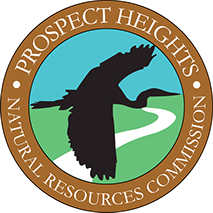Prospect Heights Natural Resources Commission
























This talk is an in-person presentation at the library and available on Zoom.
Nature Speaks is free admission but registration is necessary.
Zoomers will receive a link from the Library as the even approaches.
July19th, 2023 - Grace Hart - Live in-person at the Library and zoom Presentation 7:00 PM - 8:30 PM - "Saving the Bees: What Does it Mean, and What Role do Honey Bees Play?"
Please join us as we welcome Grace Hart, Urban Beekeeper for her presentation "Saving the Bees: What Does it Mean, and What Role do Honey Bees Play?"
The relationship between humans and honey bees is one that spans generations and time, with evidence of beekeeping dating back to ancient Egypt to medieval Europe to now. The way beekeeping looks has evolved countless times before landing on the widely recognized iconic Langstroth hive.
The increasing popularity of backyard and urban beekeeping has brought up important questions of how to be a responsible beekeeper. Many people believe that the narrative of “saving the bees” is as simple as keeping a backyard beehive. What they don’t realize is that there is a complex ecosystem of native bees that need to be part of the conversation. We have over 4,000 species of native bees in North America that are in need of the same advocacy that we give to the honey bee.
Inspecting a roof top installation
A rainbow of pollen inside a honey bee hive
The Queen with her workers
All of this begs the question: why do we keep honey bees? The most obvious reason is for honey, but their value goes far beyond being an agricultural product. The answer is quite complex, but it boils down to their accessibility in getting people excited about pollinators. Showing people a frame of honey bees gives them a tangible look into the lives of pollinators and hooks people into the “save the bees” conversation. They essentially serve as an ambassador for the countless native pollinators who don’t live in a colony we can easily access. Once people fall in love with the bees, they inevitably ask how they can help. Using that excitement can be a powerful tool to encourage people to make lifestyle changes that make the world a friendlier place for all pollinators. Taking it a step further, honey bee hives can be an excellent bio indicator to collect data and improve the diversity of resources available for pollinators.
Bombus impatiens - Common eastern bumble bee (native)
Although the honey bees are valuable in the fight to make the world more pollinator friendly, It is important as a beekeeper to be responsible for your impact. In order to make sure you are not having a negative impact, it is necessary to be thoughtful about two things: hive numbers and hive health. Without monitoring those two things you could be spreading disease in contributing to over competition between honey bees and native bees.
Honey bee
Grace Hart is a professional urban beekeeper for Alvéole, working with honey bees in the Chicago area. Before working with bees, Grace has dipped her toes into quite a few different realms of animal care, including chickens, goats, pigs, donkeys, and shelter dogs. Caring for bees is not all too different from any other animal, but the added bonus of urban beekeeping is that she gets some of the best views in the city that nobody else gets to see. Grace is passionate about urban greening and ecology, and loves that she gets the opportunity to spread the word to make Chicago a more pollinator friendly city.
A frame full of capped honey bee brood
Grace Hart and a few hundred friends.